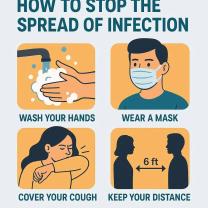What are some home remedies to clean your lungs?
Maintaining respiratory health is crucial for overall well-being. While home remedies cannot replace medical treatment, they can complement a healthy lifestyle. Here are some natural ways to support lung cleansing and respiratory health:
Hydration: Drink plenty of water to keep your respiratory passages moist and help thin mucus, making it easier to clear your airways.
Steam Inhalation: Inhale steam from a bowl of hot water to help loosen mucus and soothe your airways. You can add essential oils like eucalyptus or peppermint for added benefits.
Saltwater Gargle: Gargling with warm saltwater can help soothe a sore throat, reduce inflammation, and remove irritants from your throat.
Herbal Teas: Certain herbal teas, like ginger, licorice root, and mullein, may have soothing and expectorant properties that can help with respiratory discomfort.
Eucalyptus Oil: Inhaling the steam of eucalyptus oil added to hot water may help open up airways and ease congestion.
Honey and Lemon: Mixing honey and lemon in warm water can soothe a sore throat and provide some relief from coughing.
Turmeric: Turmeric's anti-inflammatory properties may help reduce irritation in the lungs. Consider adding it to your diet or consuming it as a tea.
Vitamin C-Rich Foods: Foods high in vitamin C, like citrus fruits and bell peppers, can support your immune system and lung health.
Quercetin-Rich Foods: Quercetin, found in foods like apples, onions, and berries, is thought to have anti-inflammatory and antioxidant effects that benefit lung health.
Omega-3 Fatty Acids: Foods rich in omega-3 fatty acids, like fatty fish (salmon, mackerel) and flaxseeds, can have anti-inflammatory effects.
Breathing Exercises: Deep breathing exercises can help strengthen respiratory muscles, improve lung capacity, and promote relaxation.
Physical Activity: Regular exercise supports lung function, improves circulation, and helps maintain a healthy weight.
Avoid Smoke and Pollutants: Minimize exposure to tobacco smoke, indoor pollutants, and outdoor air pollution, as they can harm your respiratory health.
Maintain Indoor Air Quality: Use air purifiers and ensure proper ventilation in your home to reduce indoor air pollutants.
Avoid Allergens: Identify and minimize exposure to allergens that can trigger respiratory symptoms.
Remember, it's important to consult a healthcare professional before trying any new remedies, especially if you have pre-existing respiratory conditions. These home remedies can be used as complementary measures to support respiratory health but are not a substitute for medical care. If you experience severe respiratory symptoms or have a chronic respiratory condition, seek medical attention promptly.












